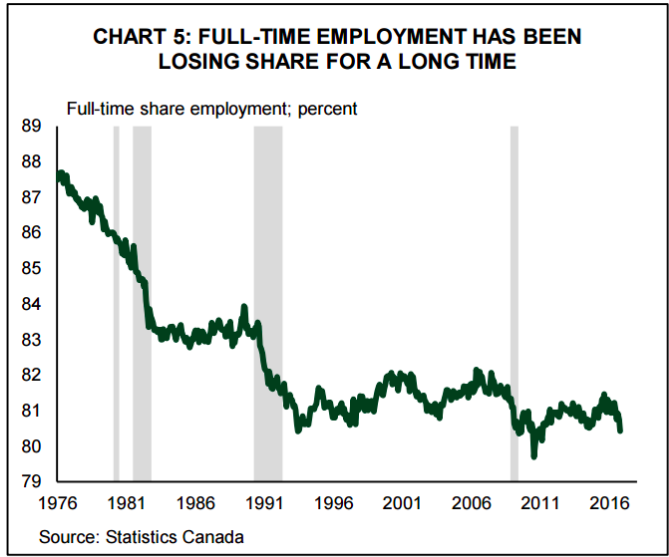Canada added 45,000 jobs in June — more than four times the number of jobs that most economists expected the country to gain last month. Canada’s unemployment rate now stands at 6.5 percent, a slight improvement from last month’s 6.6 percent.This has actually been the best quarter for employment in Canada since 2010. So then why does it feel like so many Canadians, especially recent graduates, are still struggling to find work?The answer lies in the breakdown of these job gains. The private sector added 17,800 positions, but most of these jobs were low-paid, part-time service sector jobs. In fact, most of June’s job gains game from the addition of part-time work — 37,100 positions to be exact — a sharp contrast to the weak 8,100 new full-time jobs that were added to the economy.Since October 2016, unemployment has been on a clear downward trajectory in Canada, but a key theme in these job gains has been the increase in availability of part-time jobs, coupled with a decline in the number of full-time jobs.This is unsurprising — the West’s neoliberal economic model over the last four decades has granted corporations an almost monopolistic power to rake in profits at any cost. The result has been rapid outsourcing, and the growth of low wage jobs.Full-time manufacturing jobs that used to drive Western economies now barely exist — the growth of the service sector in place of the manufacturing sector has led to the creation of more part-time jobs, just because of the nature of the sector. Many workers in admin positions at banks and insurance companies (the two biggest service sector employers in Canada), are on contract, or don’t work a full 40-hour week.The proliferation of the real estate sector in Canada has also contributed to the number of part-time jobs. Real estate agents, for the most part, get paid on commission. Their work is thus dependent on the ebbs and flows of the market. Home construction and renovation jobs also fall into this seasonal/part-time category.In 2016, according to a TD Economics report, almost all the jobs created in Canada were part-time. Sure that was partly due to the large number of full-time jobs (65,000) lost in Alberta, Saskatchewan and Newfoundland & Labrador due to the oil slump, but if you look at the 40 year trajectory of job growth in Canada, there’s a clear and rapid decline in the availability of full-time employment. This chart, courtesy TD Economics, illustrates this trend well. In 1976, almost 88 percent of jobs in Canada were full-time. By 2016, only 80 percent of jobs were considered full-time. An eight percent loss in full-time employment might not seem large, but by volume of jobs, it is indeed significant.But June’s job report, is being met with a great deal of positivity by economists. “Canada’s job market is getting close to what economists consider to be full-time employment — when just about every adult who’s able and willing to work has a job,” CIBC economist Avery Shenfeld wrote in a research note.If only job stability, and full-time work factored into the calculation of the unemployment rate.Follow Vanmala on Twitter
This chart, courtesy TD Economics, illustrates this trend well. In 1976, almost 88 percent of jobs in Canada were full-time. By 2016, only 80 percent of jobs were considered full-time. An eight percent loss in full-time employment might not seem large, but by volume of jobs, it is indeed significant.But June’s job report, is being met with a great deal of positivity by economists. “Canada’s job market is getting close to what economists consider to be full-time employment — when just about every adult who’s able and willing to work has a job,” CIBC economist Avery Shenfeld wrote in a research note.If only job stability, and full-time work factored into the calculation of the unemployment rate.Follow Vanmala on Twitter
Advertisement
Advertisement
